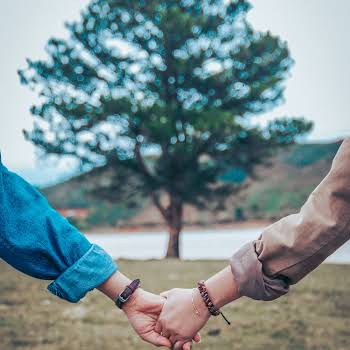By Kate Demolder
24th Aug 2024
24th Aug 2024
We are more open about sex than ever before—living in a present of sexual plenty. Yet statistics say we’re not having any. Kate Demolder debates the paradox of sexual liberation.
In March 2020, when then-Taoiseach Leo Varadkar announced, from a pulpit, the closure of schools, places of work and the St Patrick’s Day Festival because of an unknown virus that would soon come to be known as Covid-19, many predicted great surges in sexual activity. Natural disasters have yielded such results before; the 2007 Gloucestershire floods lead to a baby boom; nine months after New York suffered a 10-hour power cut in 1965, there was an apparent surge in the birth rate and following an 8.8-magnitude earthquake that struck Chile in February 2010, the Chilean health ministry reported “a marked increase in obstetric consultations in the most damaged areas” nine months afterwards. “The lights went out and people were left to interact with each other,” a sociologist called Paul Siegel excitedly told the New York Times at the time.
No such luck. While Irish findings are difficult to come by, a study published in The Journal of Sexual Medicine in November 2021 found that the pandemic had caused a small but significant diminution in Americans’ sexual desire, pleasure, and frequency.
This finding was based on data from the National Survey of Sexual Health and Behaviour (NSSHB), comparing over 8,500 individual responses from 2009 and 2018. The results echoed a similar study in the UK, called the National Surveys of Sexual Attitudes and Lifestyles (Natsal), which has been collecting information about the public’s sexual experiences for over three decades.
The Natsal researchers have found that with every survey, the average number of occasions of sex per week has decreased: in 1991, respondents said they had sex five times a month. In 2001, this was down to four times per month, and by 2012, the average number was three per month. Unfortunately, the fourth survey was postponed due to Covid-19, though the team aimed to complete the study in 2022-23.
Loneliness epidemic
It’s understandable how the threat of a deadly virus might have an altogether anaphrodisiac effect. But, aside from the fact that meeting new people and venturing outside one’s house was downright illegal, evolutionary psychologists speculate that we have a “behavioural immune system” that protects us in times of plague by making us less attracted to and less motivated to affiliate with others.
What’s less than understandable, however, is the reasoning behind sexual ambivalence in the years preceding. One partial explanation for this trend is that today’s young adults are less likely to be married and more likely to be living at home with their parents than previous cohorts. In Ireland, according to the Central Statistics Office, one in 10 people over the age of 18 is an adult living in their parents’ home. “The housing crisis has been a phenomenal stressor for younger generations,” Psychosexual and Relationship therapist Aoife Drury tells IMAGE. “It’s also no doubt impacted how we feel in terms of our own security.”
Sex is so much determined by culture, Dr András Költo (psychologist and specialist in health promotion from the Health Promotion Research Centre at NUI Galway), says. “Asking someone about their experiences of sexual intercourse could mean something different in Ireland, than in Germany, than in Hungary. There’s large intercultural and cross-cultural variation. That said, it’s absolutely true that we, internationally, are having less sex.
“Adolescents and adults across the board. And a lot of people attribute it to the loneliness epidemic.” Loneliness, as we have been taught, is a one-pronged emotion, defining it entirely too narrowly. Properly understood, loneliness is a personal, societal, economic, and political condition—not just “a feeling of being unhappy because you have no friends or people to talk to,” as described by the Oxford English Dictionary, but also feeling unsupported and uncared for by friends, employers, community and government.
“We all have smartphones and have changed the pattern of our behaviour,” Költo continues. “In my childhood, we didn’t have them and I can clearly remember more physical contact. Today we don’t speak to people on the bus, in taxi cabs, in shops. I remember seeing those plexiglass walls erected to maintain space during Covid-19 and they scared me because they were like a bell jar. We’re just getting more and more scared of each other; Covid-19 reinforced this mutual stigmatisation of each other, something that was already there way before the pandemic.”
A world that’s pulling apart
Loneliness is a long-term process, accelerating a kind of generalised alienation, allowing us all to view others as frightening. This has been happening over time, by way of the climate crisis, overpopulation, the pandemic and even in mental health capacities. It’s what the thesis of economist Noreena Hertz’s book The Lonely Century, centres itself around; “a world that’s pulling apart,” in which soaring rates of social isolation threaten not only our physical and mental health but the health of our democracies.
In it, Hertz cites many factors that have contributed to this dystopian moment—among them, smartphones, the gig economy, contactless spending, the rise in single-person households, open-plan offices, replacing individual shops with globalising hyper-chains, and anti-homeless architecture—but she believes that the deepest roots of our current crisis lie in the neoliberal revolution of the 1980s and the ruthless free-market principles championed by Thatcher and Reagan. In giving license to greed and selfishness, she writes, neoliberalism fundamentally reshaped not just economic relationships “but also our relationships with each other.”
In the thirteen years since the last national representative sex survey was conducted in Ireland, a number of changes have also taken place within positive circumstances in Irish sexual life; the understanding of asexuality; generalised empowerment over sex, showing it’s okay to opt-out of sex; AI sexual habits. And while these can be seen as good things, they are telling of the global shift we’re currently in, Költo smiles. “It’s a double-edged sword because sex is one of the greatest vitality generators. This is what keeps people connected. There is ample evidence that people who are regularly in sexual contact with another person or other persons they love are healthier than others. It’s one of the most important health protective factors.
“So on the one hand, yeah, it’s good for some people that sex is not imposed on us and that they aren’t pressured to be a sexual person. Although, on the other hand, I think many people are disenfranchised from sex and they are genuinely not happy about not having sex. They are missing sex and they just can’t find a partner.”
The human experience
As per Foucault, “Sex is the secret which is never fully told”, but due to an overriding openness—a hangover from the 1960s and early 1970s approach to free love—some say that while sex used to be characterised by its spontaneity and excitement, the younger generation now takes a more detached, procedural view.
Too, have we come to live in an over-sexualised society; a phenomenon that has become dramatically accelerated over recent years. The prominence of internet porn has made sex of everything, and television shows like Naked Attraction, and Naked And Afraid, mean sexualised imagery is omnipresent and thus lacking in stimulation.
To this, many argue, we have become numb—something that isn’t being taken very seriously nor being given proper credence. Sexuality is such an important part of life, and understanding changes that occur matters to how we understand what is shifting about the human experience. We know that sexual activity can help people to relax, fall asleep, reduce stress, feel intimate and connected and thereby improve their relationships—and may even help to boost their immune system.
And sex can also just be fun, pleasurable and enjoyable—a way to express oneself in a vulnerable situation, with someone you care for. Sexual health is multidimensional and not just about the presence or absence of infections or disease but about the potential for pleasure, access to accurate information about sexuality, bodily autonomy and the ability to have sexual experiences that are free from violence or coercion.
So instead of making people feel bad about their sex lives (or their lack thereof, misunderstanding or complicated routines) understanding why our minds are working the way they are can help us feel happier with what we’ve got—whether that’s three times a month, three times a year or three times a fortnight.
This article was originally published in May 2023.























